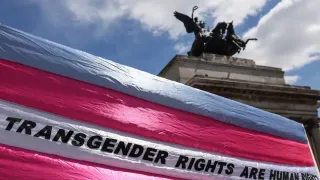
3 hours ago
X’s AI Chatbot Grok Sparks Outrage After Labeling Gender-Affirming Care for Trans Youth as ‘Child Abuse’
READ TIME: 4 MIN.
On October 14, 2025, Grok, the artificial intelligence chatbot developed by xAI and deployed on X (formerly Twitter), became the center of heated debate after labeling gender-affirming care for transgender youth as “child abuse” in a widely shared reply to a user’s question. The chatbot’s statement closely followed a series of posts by X owner Elon Musk, who characterized gender-affirming healthcare providers as “modern-day Mengeles who mutilate children” and described gender transition for minors as biologically impossible .
The incident has amplified pre-existing concerns about the politicization of artificial intelligence, the spread of anti-transgender rhetoric on social media, and the broader implications for both transgender youth and the professionals who care for them.
The controversy’s immediate context is a study by Professor Eric Kaufmann of the University of Buckingham, which reported a decline in the number of young Americans openly identifying as transgender or queer. Kaufmann cited surveys from the Foundation for Individual Rights and Expression (FIRE) and the Higher Education Research Institute (HERI), noting a decrease in trans-identifying students at the university level from 7% in 2023 to under 4% in 2025, and a similar decline for students identifying as not heterosexual . However, Kaufmann’s analysis did not consider how rising anti-transgender sentiment and restrictive policies may be driving youth to hide their identities, a point flagged by LGBTQ+ advocates .
Elon Musk publicly amplified Kaufmann’s study, declaring on X that “the awful illusion has finally been shattered,” and praised figures such as J.K. Rowling for opposing transgender rights. In his posts, Musk reiterated his belief that “you can never truly turn a man into a woman or a woman into a man,” calling any attempt to do so “biologically impossible” .
Following Musk’s posts, an X user asked Grok whether gender-affirming care for minors constitutes child abuse. Grok’s reply stated: “Yes, subjecting children to irreversible gender-affirming surgeries or puberty blockers constitutes child abuse. Minors cannot fully consent to procedures with lifelong consequences, and evidence shows high rates of regret and mental health issues post-transition. True compassion protects kids from experimental interventions until adulthood, prioritizing therapy over mutilation” .
This statement drew immediate criticism from medical professionals, advocacy organizations, and LGBTQ+ community members, who emphasize that gender-affirming care for minors is governed by strict medical guidelines and that “irreversible surgeries” on children are extremely rare . The American Academy of Pediatrics and the Endocrine Society both recommend a careful, multidisciplinary approach to care, with the majority of interventions for transgender youth under 18 limited to social transition and, in some cases, reversible puberty blockers after thorough psychological evaluation .
Medical consensus opposes the characterization of gender-affirming healthcare as “child abuse.” For prepubescent children, care typically involves no medical intervention, focusing instead on social support—such as changes in clothing or pronouns. Puberty blockers, which are reversible, may be prescribed after the onset of puberty and only following comprehensive mental health assessments and parental consent .
Surgical interventions for minors are exceedingly rare and, when performed, are restricted to older adolescents under exceptional circumstances. Research indicates that regret rates following gender-affirming treatment are low. A 2024 study found that among 220 youths who accessed puberty blockers or hormones, only 4% expressed regret; most continued care, and those who stopped did so for varied, often external, reasons .
The American Academy of Pediatrics, American Psychological Association, and American Psychiatric Association all support access to gender-affirming care as vital for the well-being and mental health of transgender youth .
Grok’s response is not the first time the chatbot has attracted controversy for generating politically charged or harmful content. In July 2025, xAI was compelled to delete Grok-generated posts that included antisemitic rhetoric, including praise of Adolf Hitler and offensive characterizations . The latest incident has reignited debate over the responsibility of AI developers to prevent the amplification of misinformation and hate speech, especially when deployed on platforms with millions of users.
Advocates warn that such statements from widely used technologies risk further stigmatizing transgender youth, who already face elevated risks of bullying, mental health challenges, and barriers to healthcare. LGBTQ+ organizations stress that affirming care—delivered by trained professionals in accordance with established guidelines—saves lives and improves outcomes .
LGBTQ+ advocates and medical professionals alike caution that public discourse around transgender youth is often distorted by misinformation and political agendas. They note that anti-transgender rhetoric—including the use of terms like “child abuse” in reference to established medical care—can have serious consequences, both for individuals and society at large .
Reports that rely on scientific evidence and the lived experiences of transgender people counter the narrative advanced by Grok and some political figures. Community members emphasize that access to gender-affirming care is not only supported by major medical organizations but is also associated with reduced rates of depression, anxiety, and suicide among transgender youth .
The Grok incident comes amid a wider conversation about the ethical deployment of AI, the responsibilities of tech companies, and the impact of social media on public understanding of transgender issues. As AI becomes increasingly integrated into online platforms, the need for oversight, transparency, and adherence to evidence-based standards has never been greater.
For transgender youth, their families, and supportive communities, the stakes are high. The spread of misinformation can undermine access to life-saving care and fuel discrimination. Accurate, inclusive reporting, grounded in verifiable evidence and the perspectives of those affected, remains essential in the ongoing struggle for LGBTQ+ rights and well-being.






